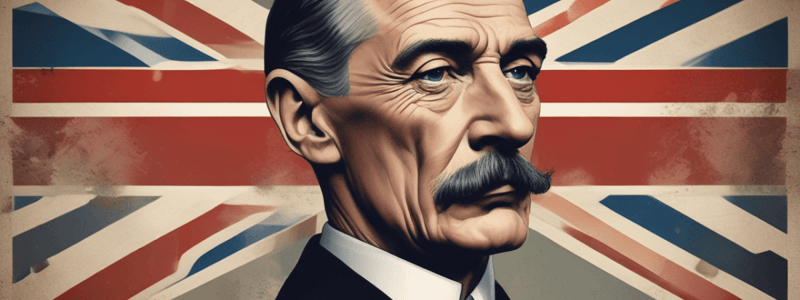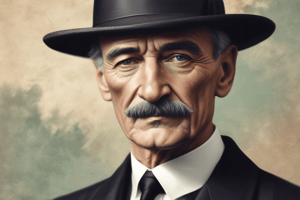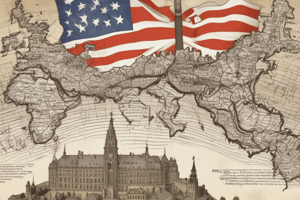Podcast
Questions and Answers
Who became prime minister in 1937 after Stanley Baldwin's resignation due to ill health?
Who became prime minister in 1937 after Stanley Baldwin's resignation due to ill health?
- Winston Churchill
- Neville Chamberlain (correct)
- Stanley Baldwin
- Lord Halifax
The British Expeditionary Force was mobilised to France immediately after the declaration of war in September 1939.
The British Expeditionary Force was mobilised to France immediately after the declaration of war in September 1939.
False (B)
What was the term coined by an American journalist to describe the period of little action between September 1939 and April 1940?
What was the term coined by an American journalist to describe the period of little action between September 1939 and April 1940?
The Phoney War
Chamberlain faced the full fury of both opposition and government benches for the incompetent handling of the war in the ___________ debate in Parliament.
Chamberlain faced the full fury of both opposition and government benches for the incompetent handling of the war in the ___________ debate in Parliament.
Why did the National Government allow a series of concessions to Nazi Germany?
Why did the National Government allow a series of concessions to Nazi Germany?
Winston Churchill's wartime cabinet was composed of only Conservative politicians.
Winston Churchill's wartime cabinet was composed of only Conservative politicians.
Match the following politicians with their respective roles:
Match the following politicians with their respective roles:
What was the main theme of Winston Churchill's first speech as prime minister to the House of Commons?
What was the main theme of Winston Churchill's first speech as prime minister to the House of Commons?
The British Expeditionary Force withdrew to Dunkirk and awaited evacuation due to the German Army's successes.
The British Expeditionary Force withdrew to Dunkirk and awaited evacuation due to the German Army's successes.
What was the name of the agreement arranged by Winston Churchill to obtain economic aid from the USA?
What was the name of the agreement arranged by Winston Churchill to obtain economic aid from the USA?
The Ministry of _______________________ was one of the specific ministries developed by Winston Churchill's government to control the wartime economy.
The Ministry of _______________________ was one of the specific ministries developed by Winston Churchill's government to control the wartime economy.
During wartime, production levels were decided by:
During wartime, production levels were decided by:
The post-war Labour government maintained a completely free market economy.
The post-war Labour government maintained a completely free market economy.
What was the respective roles of the following ministries:
What was the respective roles of the following ministries:
What was the significance of American 'Liberty Ships' during the war?
What was the significance of American 'Liberty Ships' during the war?
By 1944, Britain produced _______________________ aircraft per year.
By 1944, Britain produced _______________________ aircraft per year.
The 1939 American Neutrality Act allowed Britain to buy supplies on credit from the USA.
The 1939 American Neutrality Act allowed Britain to buy supplies on credit from the USA.
Thatcher's economic policy was aimed at reviving the British economy by freeing the ______.
Thatcher's economic policy was aimed at reviving the British economy by freeing the ______.
Tax cuts, deregulation and privatisation led to a smaller economic role for the government by ______.
Tax cuts, deregulation and privatisation led to a smaller economic role for the government by ______.
Between 1985 and 1988, unemployment fell and economic growth ______.
Between 1985 and 1988, unemployment fell and economic growth ______.
There was a ______ culture in the southeast during the economic boom.
There was a ______ culture in the southeast during the economic boom.
The economic problems returned during the recession of ______ and 1990.
The economic problems returned during the recession of ______ and 1990.
Study Notes
Chamberlain's Premiership (1937-1940)
- Neville Chamberlain became Prime Minister in 1937 after Stanley Baldwin's resignation due to ill health.
- Chamberlain's government faced economic recovery, falling unemployment, and stable prices, but struggled with rearmament due to the growing anti-war movement.
- Concessions were made to Nazi Germany, allowing Hitler to disregard the Treaty of Versailles, due to the desire for peace among the electorate.
- Following the declaration of war in September 1939, the British Expeditionary Force was mobilized to France, but a seven-month stand-off ensued with little action.
- The 'Phoney War' ended with a failed British attempt to save Norway from German invasion, leading to Norway's occupation by Germany.
- Chamberlain faced criticism in Parliament for the handling of the war and narrowly won a vote of no confidence, but ultimately recognized it as a defeat.
- Chamberlain attempted to form a new coalition government but was unsuccessful, paving the way for Winston Churchill to become Prime Minister.
Churchill's Premiership (1940-1945)
- Winston Churchill became Prime Minister on May 10, 1940, and formed a wartime cabinet with a mix of Conservative, Labour, and Liberal politicians.
- Churchill's cabinet included Labour politicians from the center and right of the party who were willing to put national interests above party politics.
- In his first speech as Prime Minister, Churchill offered "blood, toil, tears, and sweat" to the House of Commons, emphasizing the need for British resilience.
- As the German army advanced through France, the British Expeditionary Force withdrew to Dunkirk, awaiting evacuation.
- Churchill rejected calls for a negotiated settlement with Germany, arguing that Britain would become a "slave state" if it agreed to German terms.
Creating a Managed Economy (1939-1945)
- Winston Churchill's government took control of war production, establishing specific ministries to control the wartime economy, such as the Ministry of Aircraft Production and the Ministry of Food.
- The government intervened in the economy, taking over essential war industries and determining production levels, rather than relying on market forces.
- The managed economy was maintained by the post-war Labour government, particularly through the nationalization of key industries.
- Military expenditure increased significantly, with Britain producing 15,000 aircraft in 1940, rising to 47,000 in 1944, and between 6,000 and 8,000 tanks per year.
- The USA provided economic aid to Britain between 1939 and 1941, including the Lend-Lease Agreement, which allowed Britain to receive resources with the promise of payment after the war.
- American 'Liberty Ships' provided Britain with an economic lifeline throughout the war, supplying essential goods and raw materials.
Thatcher's Economic Policy
- Aimed to revive the British economy through market liberalization.
- Allowed rising unemployment as a strategy to control inflation.
- Focused on returning nationalised industries to profitability.
Key Characteristics of Thatcherism
- Implemented tax cuts to stimulate economic activity.
- Emphasized deregulation, reducing government intervention in the economy.
- Engaged in privatization of state-owned enterprises, significantly reducing the government's economic role by 1990 compared to 1979.
Economic Outcomes
- Between 1985 and 1988, there was significant economic growth:
- Unemployment decreased.
- Economic growth increased.
- Inflation rates remained low during this period.
Cultural Impact
- Emergence of a "loadsamoney" culture in the southeast, reflecting newfound wealth and consumerism.
Economic Challenges
- The economic boom was temporary; challenges re-emerged during the recession of 1989 and 1990.
- Highlighted the volatility of Thatcher's economic policies and their long-term sustainability.
Studying That Suits You
Use AI to generate personalized quizzes and flashcards to suit your learning preferences.
Description
Learn about Neville Chamberlain's premiership, the National Government, and the international order during a time of economic recovery and growing anti-war movement.




